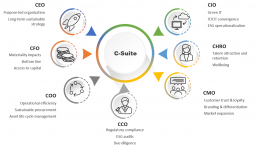Did you know that Sustainability is the top business risk for CEOs in Europe, even above cybersecurity? (IDC EMEA, CEO Survey, January 2023, n=108). This is the first time sustainability has been at the top of the board’s agenda, and it is likely to stay for some time. But why is it a risk and not an opportunity? Why saving the planet is seen as a threat to business?
For many, climate change and the new sustainability regulations are a disruption to their operations. After all, today’s economy was built on the premise that Nature had given us a cheque in blank, with a limitless use of resources. How wrong it was.
Therefore, having Mother Nature behaving in the most unpredictable ways (e.g., heatwaves, floods, droughts) and government policies shaping business operations (e.g., taxes, quotas, disclosures) can be painful.
These are some examples: if you’re a semiconductor company with factories in South Asia, severe droughts can be material to your manufacturing processes as governments can prioritize water for local people. Or, if you’re a mobile phone manufacturer, the use of plastic packaging can be material to your business because of taxes or a complete ban by governments.
Sustainability is a moral, regulatory, and ultimately business mandate. There’s no opt-out: stakeholders are watching closely, e.g., customers, investors, business partners, regulators. As the executive of one of the world’s largest insurers shared in an interview recently “We don’t work anymore with customers that are not improving their sustainability. They are uninsurable for us“.
Therefore, if sustainability is indeed a risk, can companies turn it into a business opportunity? The answer is “yes”, according to most European companies (IDC EMEA, Future Enterprise Resilience, May 2023, n = 220).
Download eBook: Sustainability in EMEA: Opportunities for Tech Vendors, Challenges for Tech Buyers
Sustainability: Evolving from Risk to Opportunity
Sustainability can be a business opportunity if there’s a clear vision and commitment from leadership. Only then, “doing good” is embedded in every facet of work, across all business units, from procurement and production to logistics and customer service.
To make this happen, sustainability targets need to be fully aligned with the agenda and goals of each executive in the C-Suite. This is an illustrative example:
Benefits of Sustainability for Business
By addressing the agenda of the C-Suite, we can identify 7 reasons why sustainability is good for business:
- Chief Operations Officer (COO): Sustainability can drive operational efficiencies (IDC Global Sustainability Readiness Index, IDC, August 2023) across all business functions (e.g., supply chain, logistics, facilities). A sustainable firm is a fit and lean organization where “less is more”, e.g., frugality in resourcing water and energy.
- Chief Financial Officer (CFO): Investing in sustainable practices might not always deliver short term returns but can pay off in the form of resiliency and business longevity. CFOs have realized that the cost of “not acting” is greater than the cost of acting – for example, in their ability to access capital or insurance.
- Chief Marketing Officer (CMO): Sustainability is addressing the needs of a growing customer base. Buyers are looking for more transparency, honesty, and trust from suppliers. As such, brands with strong green credentials, integrity and social responsibility bring competitive differentiation.
- Chief Human Resources Officer (CHRO): Sustainability is a magnet in an organization, attracting and retaining talent. People are looking for purpose in their job and their companies (IDC EMEA Employee Future of Work Survey, March 2023). When work has direction is powerful and energizing: employees can work hard for goals they understand and feel connected to.
- Chief Information Officer (CIO): Sustainability, in an aim to reduce carbon emissions, can accelerate cloud migration, automation and optimization of IT processes (IDC Global Sustainability Readiness Index, IDC, August 2023). Moreover, based on the principle of frugality, IT assets can be rationalized based on usage and their lifecycle expanded as appropriate.
- Chief Compliance Officer (CCO): Sustainability can outshine a company against competitors in matters of corporate reputation and governance. The CCO can put in place strong stakeholder protections and build market trust.
- Chief Executive Officer (CEO): Sustainability can be a bold strategy for long-term business value. Leading with purpose can be inspiring, ignite passion amongst employees and create a culture of high-performance. B-Corps (e.g., Allbirds, Patagonia, Teapigs and Aesop) are testimony of it.
Register for the webcast: Sustainability in EMEA: The Challenge of Moving from Ambition to Action
Sustainability can be a force for good business and meet the C-Suite goals, but it needs execution for business impact (Global Sustainability Readiness Index, IDC, August 2023): it has to be internalized across the enterprise and become the “modus operandi” of getting work done, and for everyone, from the top to the bottom of the organization. But this is easier said than done. IDC research shows this is a roadblock for many enterprises: how to move from strategy to execution? Here is where the role of the Chief Sustainability Officer (CSO) comes into the picture.
Successful CSOs are executives with strong business acumen and digital skills, on the top of their sustainability expertise. Their role is not limited to appeasing the needs of different stakeholders, chiefly regulators and investors, but also a catalyst for business value creation through sustainability. Their reporting line should be direct to their CEO to give them stature in their organization.
CSOs are tech-savvy because technology is fundamentally the enabler to turn sustainability strategy into action and derive business value. For example, IoT and automation can optimize resource consumption in buildings and bring costs down; blockchain and AI can support resiliency in the supply chain.
In summary, sustainability can be an opportunity for business value when it meets the C-Suite goals. It needs a strategy that everyone in the organization understands and is passionate about – nothing is more fulfilling than knowing at the end of the working day you did something good for the planet and society. But, remember, it needs a CSO-led action plan and great technology to turn it into business value.
If you want to know more, please reach out to Angela Salmeron


